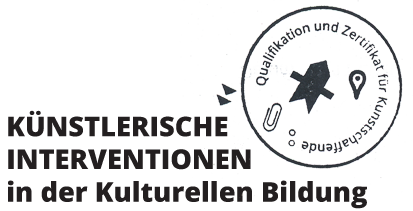

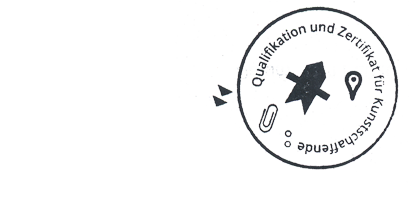
Following seven exciting modules on the topics of “Art Potentials”, “Theoretical Concepts and Discourses in Cultural Education”, “Strategies and Practice Formats”, “Cultural Education in School Contexts”, “Culture Management for Creators of Art in Cultural Education”, “Cultural Institutions as Places of Learning” and “Practice at documenta fifteen”, now, on the 15.07.2022, Module 8 introduces the conclusion of the certificate course.
How do I reliably and effectively impart knowledge I have acquired and my experiences to other artists? How can transfer be successful independently of a certain artist personality? What has changed in my attitude as an artist and mediator now that I have finished the course? The participants will be dealing with these and other questions from the 15.07.2022 on.
Fully in line with Train the trainer, in parallel to the last module and the conclusion of the course, the participants will be producing a series of information videos in the shape of webinars in order to record what has been learnt and pass it on to further course generations.
You can find further information on the other course modules heree.
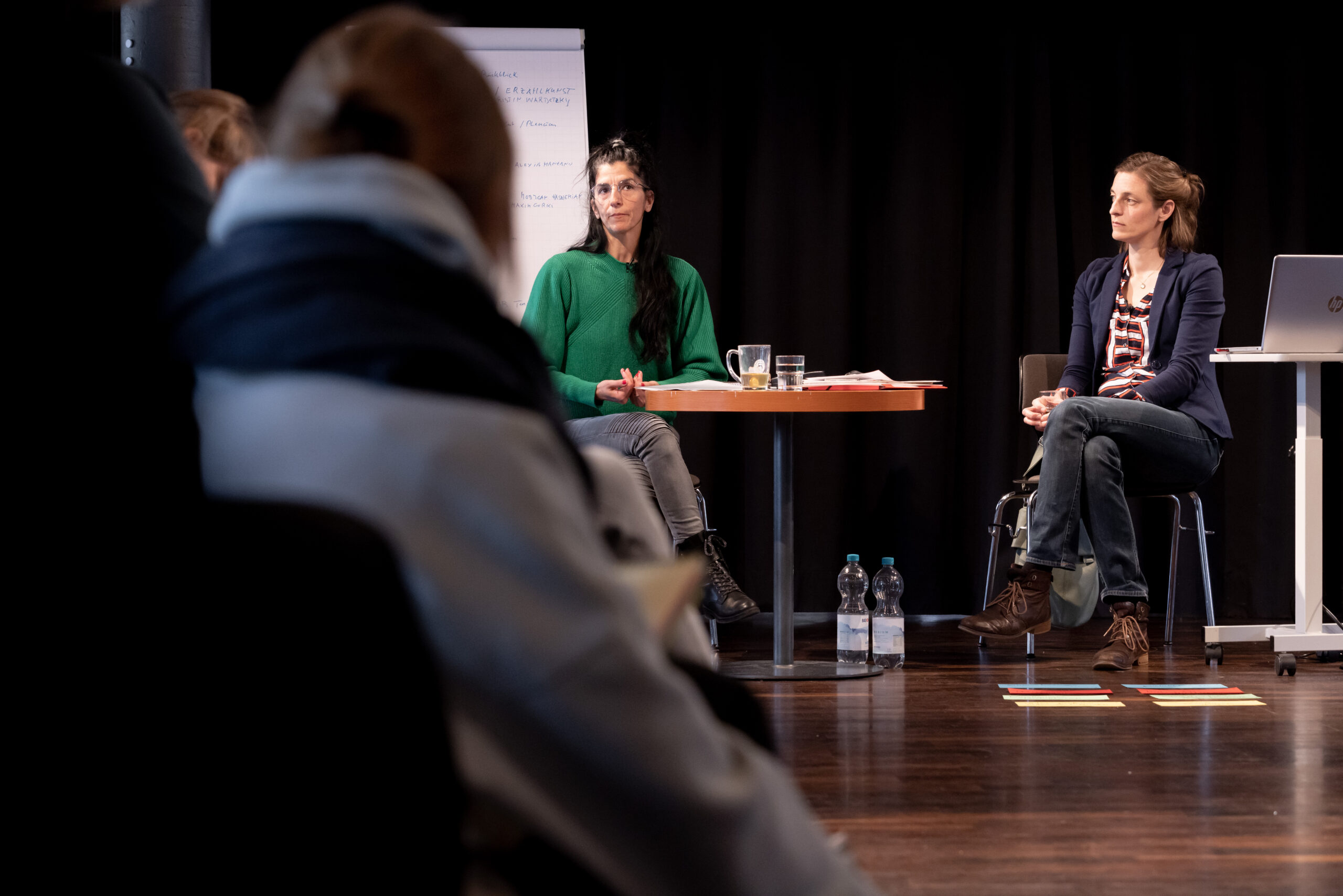
Published: 15.07.2022
An event in the context of the University of Hildesheim’s Certificate Course “Artistic Interventions in Cultural Education”, sponsored by Stiftung Mercator
Friday, 8th July – Saturday, 9th July 2022 at the University of Hildesheim / Main Campus and Cultural Campus at the Domain of Marienburg
The Symposium addresses artists who are active in the field of Cultural Education and other social contexts, academics, students and practitioners in the areas of Cultural Education and Cultural Mediation as well as representatives of cultural and education institutions and administration. https://idw-online.de/mobile/de/news793359
Art bears a special potential for Cultural Education processes. Experiencing artistic principles and processes can stimulate inquisitiveness, independent and unconventional thought and action as well as one’s self-perception and that of one’s environment among children, youths and adults, and it can enhance experiencing one’s self-effectiveness and sensitise people towards complex societal contexts. The International Symposium seeks to make accessible and discuss knowledge and insights regarding cultural and education policy programmes in various countries, illustrate the diversity of international perspectives on goals, potentials and impacts of artistic interventions in educational contexts and offer participants the opportunity to experience various artistic concepts and strategies for working in different social and educational contexts in practical workshops run by artists.
You can find more information on the Symposium here.
Published: 09.05.2022
Course co-founder Birgit Mandel published a specialist article on the contents of the Certificate Course: Artistic Interventions – Potentials for Cultural Education in kubi online this week.
Abstract
It has been emphasised again and again that art bears special potentials with which it can intervene in various societal contexts, ideally triggering changes with an educational impact at both individual and institutional level. This article examines more closely with which approaches art operates, especially in cultural education contexts. The pilot course “Artistic Interventions in Cultural Education”, which was developed by the author herself, provides the background for this. The concept of Cultural Intervention focuses on the independence of art, which develops an impact precisely because it does not adapt to the usual modes of working and to conventions. The aim of the pilot course is to support artists in developing methods based on their own artistic work which provide scope for the ideas of the participants without forfeiting their own independence as artists. Consistently conceiving Cultural Education from the angle of art while simultaneously developing an interest in and understanding of the logics of other institutions and life-worlds can contribute to making art have an impact beyond art itself.
Funding for this qualification programme for artists in Cultural Education is being provided by Stiftung Mercator, which in doing so has completed its long-standing engagement in Cultural Education.
The full article is here.
Published: 05.05.2022
Following five exciting modules on the thematic foci of “Potentials of Art”, “Theoretical Concepts and Discourses in Cultural Education”, “Strategies and Practice Formats”, “Cultural Education in School Contexts” and “Culture Management for Creators of Art in Cultural Education”, Module 6 starts on the 11.03.2022 with impulses on Cultural Institutions as Places of Learning.
The module will be moderated by course co-founder Mona Marijke Jas, who has been an Honorary Professor at weißensee kunsthochschule berlin since 2015. Among other functions, she was Faculty Member at documenta 14 in Kassel and Athens in 2017 and headed (Ver-)Mittlung (mediation/communication) at the 10th Berlin Biennale 2018. She is currently also teaching at the University of Hildesheim in the field of Cultural Education and Communication of Art. Her research focus is the artistic communication of contemporary fine art and biennales. We look forward to Module 6 with Mona Jas.
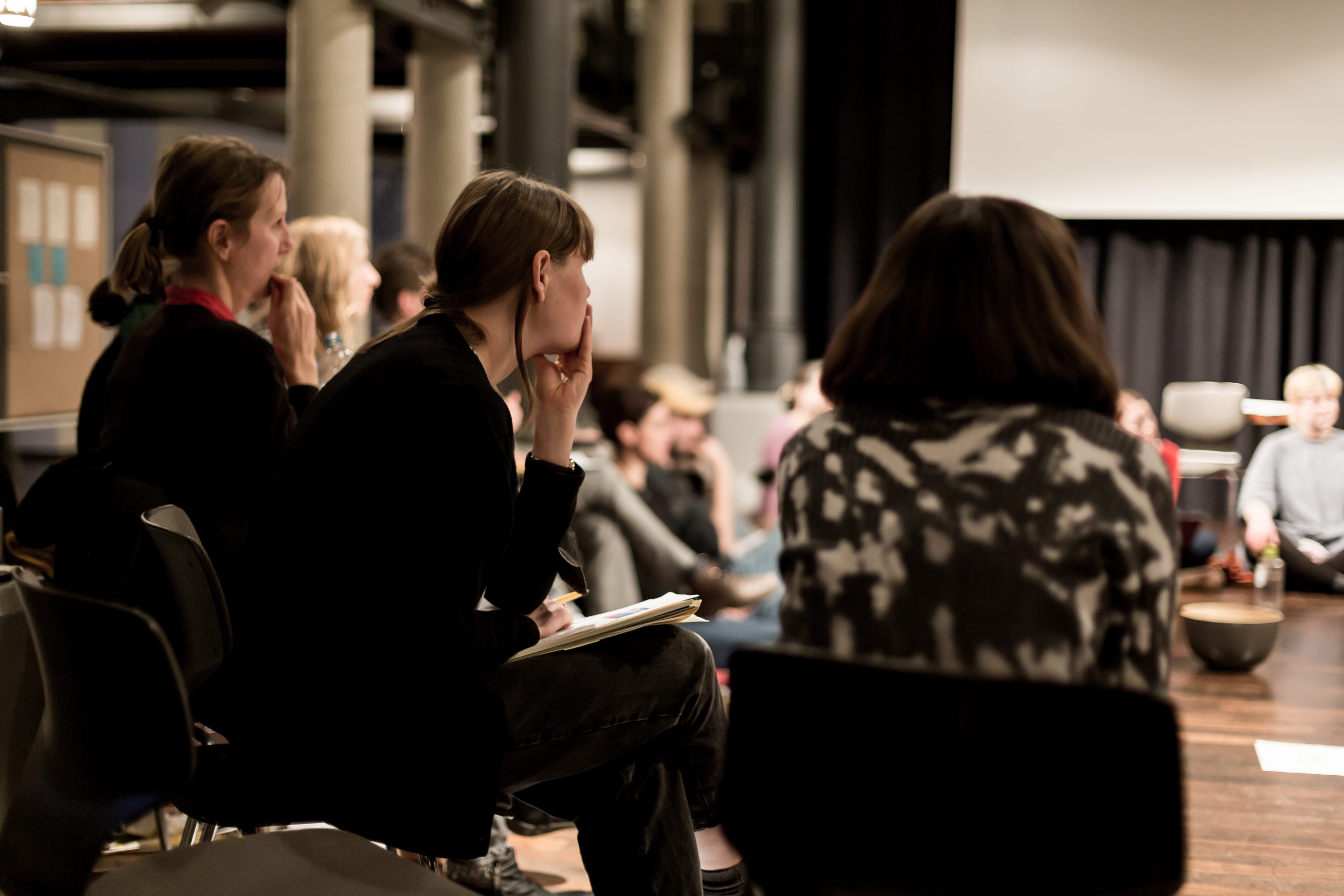
Published: 04.04.2022
An event of the Certificate Course “Artistic Interventions in Cultural Education” at the University of Hildesheim, funded by Stiftung Mercator
Friday, 8th July – Saturday, 9th July 2022 at the University of Hildesheim / Main Campus and Cultural Campus at the Domain of Marienburg
The Symposium addresses artists working in the field of Cultural Education and other societal contexts, scientists and scholars, students and practitioners in the fields of Cultural Education and Cultural Mediation as well as representatives from cultural and education institutions and administrations.
Art bears a particular potential for cultural education processes. Experiencing artistic principles and processes can stimulate inquisitiveness, independent and unconventional thought and action as well as one’s self-perception and that of one’s environment among children, youths and adults. It can also strengthen awareness of self-efficacy and of complex societal contexts. The International Symposium seeks to create access to and discuss knowledge and insights relating to cultural and education policy programmes in various countries, demonstrate a wide range of perspectives on aims, potentials and impacts of cultural interventions in educational contexts and make different artistic concepts and strategies for working in various social and educational contexts experienceable in practice workshops run by artists.
The key objectives and issues of the Symposium:
We are happy to invite you to spend two days with us getting to know and discussing international positions and gaining impulses for your own work from them.
The Symposium will be held in English.
Admission is free of charge.
The number of participants is limited to 200.
Registrations via email are still possible.
If you have any questions, please do not hesitate to contact our team at: symposium [at] uni-hildesheim [dot] de
Published: 04.04.2022
After four exciting modules on the thematic foci of “Potentials of Art”, “Theoretical Concepts and Discourses in Cultural Education”, “Strategies and Practice Formats” and “Cultural Education in School Contexts”, Module 5 starts on the 11.03.2022 with impulses on “Culture Management for Creators of Art in Cultural Education”.
Following the last two digital modules, after a long time, this module has once again been held at the Federal Academy for Cultural Education in Wolfenbüttel. The participants were given inputs on the various fields of culture management. Moderator Birgit Mandel gave an introduction to the thematic field. Among the lecturers, Siglinde Lang presented the topic of Participatory Culture Management, while Thomas Renz provided details on tax basics in culture management. In the afternoon on Saturday, Helle Becker lectured in a hybrid format on the practice fields of Cultural Education. Nicola Scherer followed with an input on the trend topics of “Cultural Entrepreneurship and Leadership”. Sophia Pompèry concluded the event with a presentation on orientation in the area of funding.
You can find an overview of the lecturers for all modules here.
Published: 28.03.2022
Following four exciting modules on the thematic foci of “Potentials of Art”, “Theoretical Concepts and Discourses in Cultural Education”, “Strategies and Practice Formats” and “Cultural Education in School Contexts”, Module 5 starts on the 11.03.2022 with impulses on “Culture Management for Creators of Art in Cultural Education”.
The Module will be moderated by course co-founder Birgit Mandel. In addition to being project head of the course, Birgit Mandel (born in 1963) works as a Professor of Culture Communication and Culture Management at the University of Hildesheim, where she heads the Masters Programme on Cultural Mediation. She is Vice-President of the Kulturpolitische Gesellschaft, a member of the Commerzbank Foundation board of trustees, for which she developed the “ZukunftsGut” award for institutional communicating of culture, as well as a member of the supervisory board of Berlin Kulturprojekte GmbH. She has conducted a wide range of research projects at the interface of culture communication, audience development and cultural policy.
We look forward to Module 5 with Birgit Mandel.
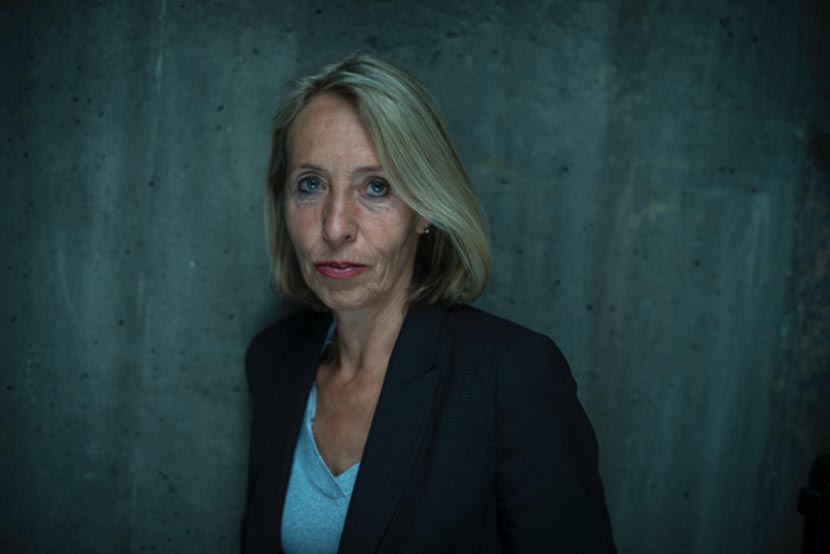
Published: 08.03.2022
The fourth “Module of Artistic Interventions in Cultural Education” was held from the 28.01.202 to the 30.01.2022. Owing to the current COVID-19 situation, the Module was transferred to a digital environment, just like the previous one. In terms of content, the Module addressed key issues such as “What makes school a culture location?” or “How can I sustainably contribute my expertise as an artist to schools?”
The Module was moderated by Friederike Schönhuth. Friederike Schönhuth was the Official Adviser on the Fine Arts and Curator of the “ars viva” award at the Association of Arts and Culture of the German Economy at the Federation of German Industries, reg. Ass. (BDI) and headed the Cultural Education Department of the “Stiftung Nantesbuch”. For the last five years, she has been working for the Crespo Foundation, where, as Head of Department, “Aesthetic Education and Art”, she is now responsible for developing and expanding existing programmes in her field. Friederike Schönhuth acted as a guide and motivator for the participants in the intensive programme. For example, Tom Braun offered a general overview of the topic of “School and Cultural Education”. Ursula Rogg gave a concrete perspective of being in a school context as an artist. Alexandra Kersten and Saskia Köhler provided input on “Collaborative Schemes at and with Schools”. Magdalena von Rudy and Nicole Berner of KLAUS presented insights into the topic of “Artists in Residence” at schools.
An overview of all lecturers so far can be found here.






Published: 21.02.2022
Following three exciting modules on the focal topics of “Potentials of Art”, “Theoretical Concepts and Discourses” and “Strategies and Practice Formats”, Module 4 starts on the 28.01.2022, giving impulses on “Cultural Education in School Contexts”. What turns school into a cultural location? How can I sustainably contribute my expertise as an artist to schools?
This time, the pilot course “Artistic Interventions in Cultural Education” run by the University of Hildesheim’s Department of Cultural Policy is not being held at the Federal Academy for Cultural Education in Wolfenbüttel. Owing to the current increase in the number of COVID-19 cases, the team have decided to also stage this Module in a digital format.
Among those invited to this Module are the partners in practice who will be presenting in-depth units in a digital environment.
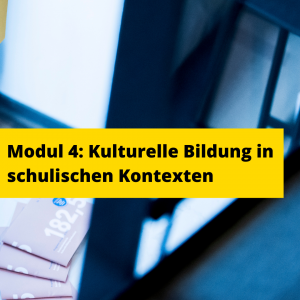
You can find more information on the Modules of the Certificate Course here.
Published: 24.01.2022
The third module of “Artistic Interventions in Cultural Education” was held from the 10.12.2021 to the 11.12.2021. Owing to the current COVID-19 situation, the Module was transferred to digital space. At least at content level, the format takes up one of the key issues: “How can digital methods enrich activities in Cultural Education?”
But what does a module actually look like in a digital environment? The following blog entry presents three of our strategies for successful digital seminars:
Aesthetic practice units
Just like in an analogue space, we started off the individual days of the Module with small aesthetic practice units. For example, on Saturday morning, Lisa Haucke (link) headed a digital body workshop in order to promote a little physical variety in front of the PC. On Friday, our fellow Lucia Matzke started off with a 15-minute dancing unit incorporating both the body and the private environment of one’s own home. Exercises such as “Dance a Fork” liven up both the atmosphere and one’s own body and work wonders in a digital environment.
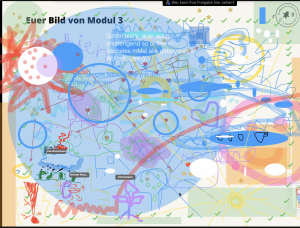
Digital Art
Video conference portals such as Zoom or BBB offer a wide range of opportunities for creative participation. For example, we were able to use the drawing tool in a split display in order to create a little artistic intervention together.
GatherTown
Despite group activities via breakout sessions, informal chats taking place in the presence of one another cannot be fully implemented in digital space. Additional time slots have to be created in the programme for talks of this nature. Towards the end of our Module, on the platform GatherTown, we set up a communication room. GatherTown is a free-of-charge tool with which real environments can be digitally modelled and where people can get together. In our case, the informal chats took place in a digitally modelled Federal Academy.
Published: 17.01.2022
From the 05.11.2021 to the 07.11.2021, the second Module of “Artistic Interventions in Cultural Education” took place at the Federal Academy for Cultural Education in Wolfenbüttel. For the 33 participants, there were inputs on various discourses addressing how to design mediating activities. Discussions were initiated in Wolfenbüttel on the topics of diversity, mediation at school and the procedural nature of creative work.
On the weekend, our wonderful lecturers also visited the Federal Academy in Wolfenbüttel in order to give the scholarship holders exciting impulses for the topic of Theories and Discourses in Cultural Education.
The Module was moderated by Vanessa-Isabelle Reinwand-Weiss. She studied pedagogics, drama and media science, Italian romance studies and philosophy. Following a Junior Professorship at the University of Hildesheim’s Institute of Cultural Policy, she has been Director of the Federal Academy for Cultural Education Wolfenbüttel since 2012, and as a Professor of Cultural Education, she continues to teach in Hildesheim. Vanessa-Isabelle Reinwand-Weiss guided the participants through the dense programme. For example, input was given on the topic of Artists in Education – theoretical approaches and empirical studies by Prof Dr Frank Jebe. Nora Amin, Dr Özlem Canyürek and Nhu Y Linda Nguyen lectured on various aspects of diversity in Cultural Education activities. One special feature of Module 2 was an introduction to the Module “Train the Trainer” with Birgitta Heller-Mevißen and Saskia Köhler on the Sunday (07.11.).
You can find an overview of all lecturers so far here.








Published: 08.12.2021
From the 05.11.-07.11.2021, the second Module of “Artistic Interventions in Cultural Education” took place at the Federal Academy for Cultural Education in Wolfenbüttel. For the 33 participants, there were inputs for various discourses on how mediation activities can be designed. Discussions were initiated in Wolfenbüttel on the topics of diversity, mediation at school and the processual aspect of artistic work.
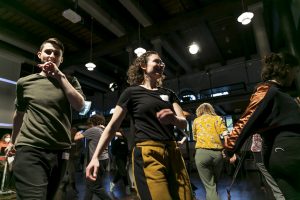
Various perspectives were opened in order to be able to link them or also delimit them from one another on site. One special feature of Module 2 was an introduction to the Module “Train the Trainer” on the Sunday (07.11.). This consolidation module offers the opportunity to pass on the skills one has acquired in the context of the certificate course as a lecturer or instructor.
Here, it was a special objective of Module 2 to provide the participants with the possibility to transfer their artistic and mediatory activities to contemporary theories and discourses. Which theoretical approaches and discourses can shape and inspire artistic activities in Cultural Education? How much participation is possible in artistic work with social groups? In what manner can artistic projects contribute to mobilise for sustainable action?
These are just a few of the questions discussed in Module 2. You can get to know the Module lecturers here.
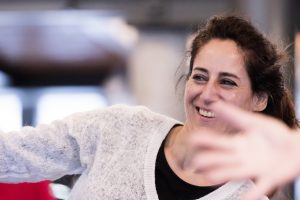
Published: 24.11.2021
From the 24.09.-26.09.2021, the first module of “Artistic Interventions in Cultural Education” was held at the Federal Academy for Cultural Education in Wolfenbüttel. Thirty-three participants as well as six lecturers and an artist filled the three days with inputs, workshops, aesthetic communication formats and artistic impulses. On our Homepage, we present three perspectives looking back at the weekend.
Not only the team but also the participants were able to look forward to an exciting exchange of views, ideas and experiences the first time they met. Coming from the branches of visual art, interdisciplinary fields, literature, music, drama and dancing, 33 scholarship-holders with a diversity of backgrounds and biographies are taking part who can benefit not only from our course but also from the different expertise of the respective others. Those who are not yet familiar with our participants can get to the scholarship-holders of the certificate course “Artistic Interventions in Cultural Education” via this link.
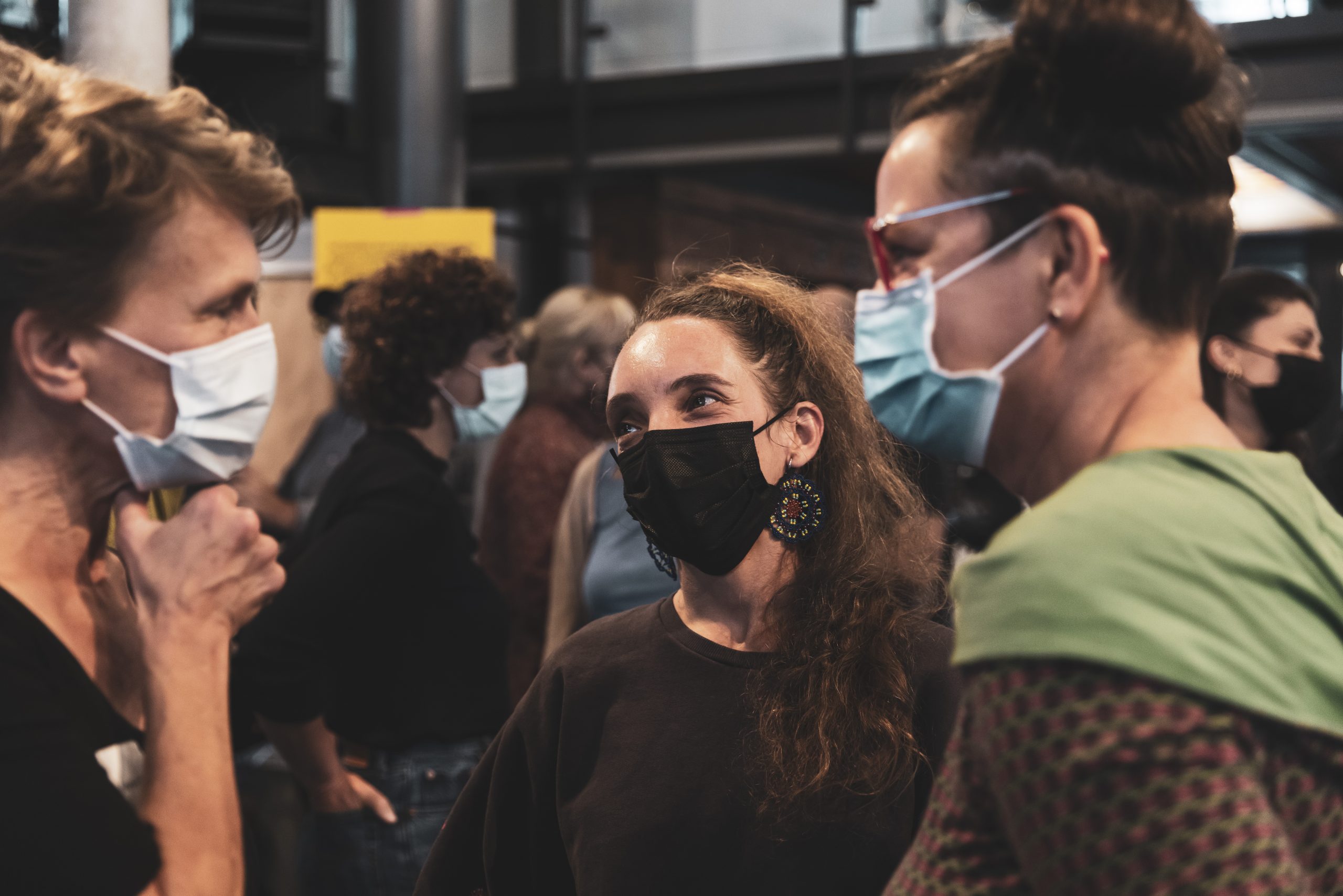
Published: 17.11.2021
From the 24.09.-26.09.2021, the first module of “Artistic Interventions in Cultural Education” was held at the Federal Academy for Cultural Education in Wolfenbüttel. Thirty-three participants as well as six lecturers and an artist filled the three days with inputs, workshops, aesthetic communication formats and artistic impulses. On our Homepage, we present three perspectives looking back at the weekend.
The performance FESTMAHL! by Ellen Kobe formed the centrepiece of the weekend. It was staged at the Schloss Museum Wolfenbüttel, a historic building which had for a long time served the Dukes of Braunschweig-Lüneburg as a Residenz.(übersetzt “residence”) Today, the Schloss Museum Wolfenbüttel boasts the baroque rooms preserved in their original state which today still bear testimony to the glamour and splendour of courtly life. During the FESTMAHL! in collaboration with cook Christoph Pemmann and his team which took place in the palace’s ceremonial hall, surrounded by original exhibits, the historic rooms came to life again with their stories and tales.
Ancient candle bearers, valuable china and other artefacts in the collection created a baroque, festive atmosphere for the evening. The Tromp-l‘oeil principle provided for a game of confusion based on seeing and understanding. The story of Ellen Kobe’s being a relative of Prussian Queen Elisabeth Christine was made so convincing with the historical artefacts serving as proof that the question remained where historical narratives and inventions actually coincided. Again and again, the participants had to ask themselves what was really genuine.
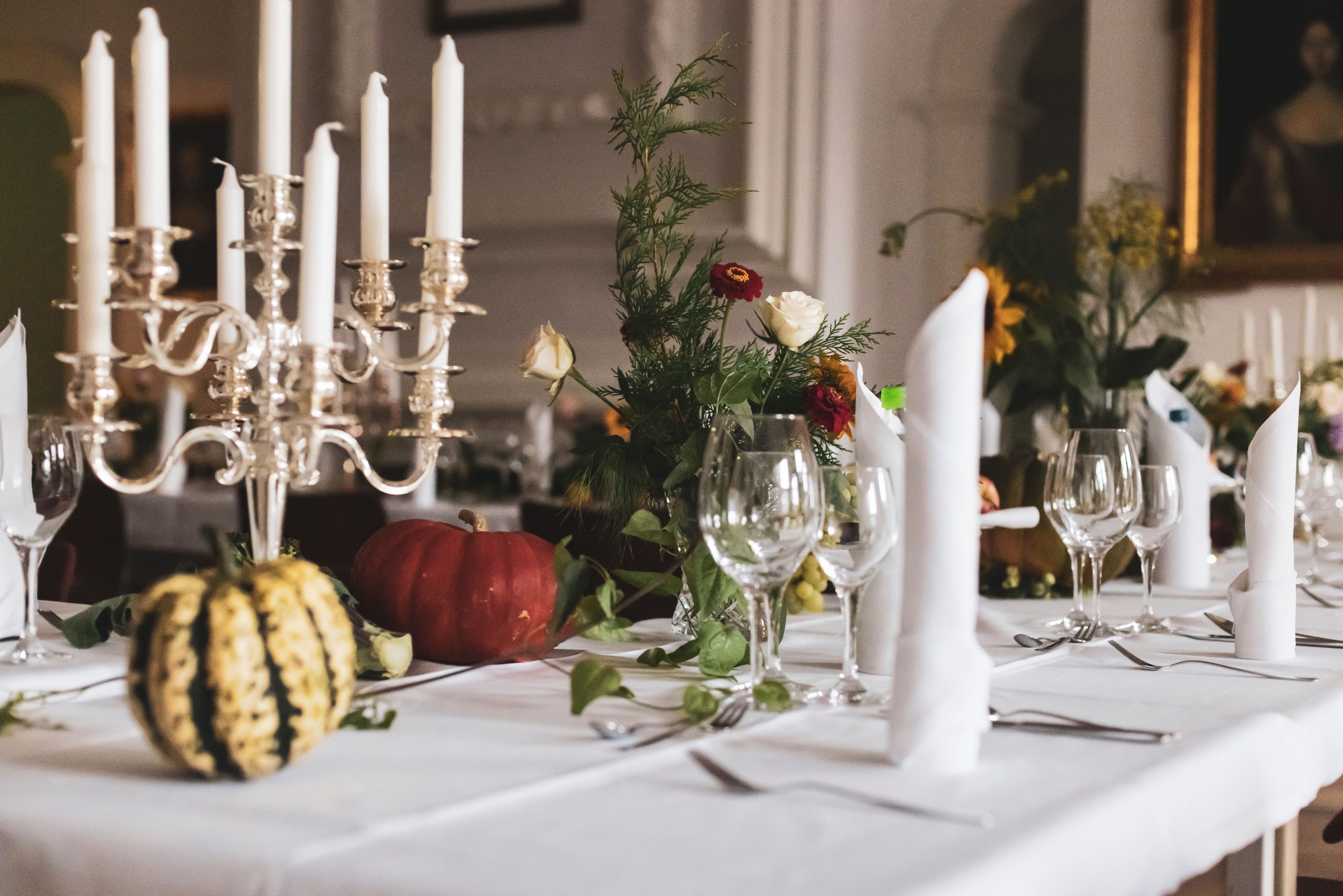
With a choreography of dining staged in accordance with the set of rules for baroque dining culture, the FESTMAHL! was turned into a place of communication and encounter among the scholarship-holders. “My identity as a performer was correctly announced by the programme, glimmered through the perspective of action and speech and remained suspended between reality and fiction.” (Ellen Kobe)
Published: 02.11.2021
The first Module of “Artistic interventions in Cultural Education” took place at the Federal Academy for Cultural Education in Wolfenbüttel from the 24.09.-26.09.2021. Thirty-three participants as well as six lecturers and one artist provided the framework for the three days with inputs, workshops, aesthetic communication formats and artistic impulses. On our Homepage, we give three retrospect perspectives of the weekend.
Getting to know the scholarship-holders, mini-workshops, speed-dating and an aesthetically staged Feast! Last week, marking the launch of “Artistic interventions in Cultural Education”, there were several innovative meeting places – both for the scholarship-holders and the lecturers – to get to know each other and share views and ideas.
One special objective of Module 1 in this context was to give the participants the opportunity to position themselves with their artistic activities. What have grand concepts like Cultural Education, art research, artistic interventions or communicating art and culture actually got to do with one’s own activities? What can art achieve on its own? And how do I define myself as an actor in this field?
These are just a few of the questions which were discussed in Module 1. You can get to know the lecturers from Module 1 here.
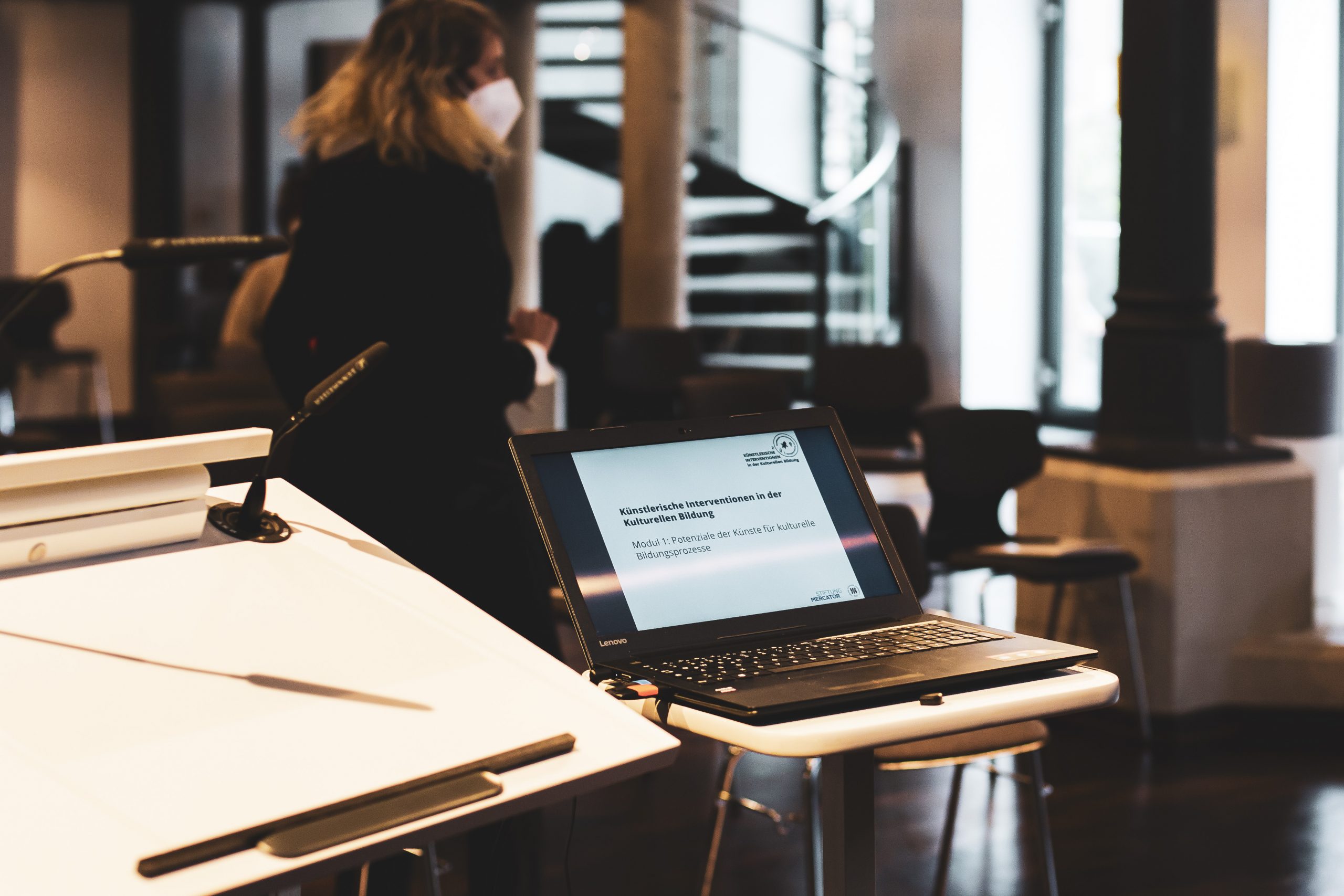
Published: 13.10.2021
The final 33 artists from various disciplines were identified to participate in the certificate course.
After an intensive selection process by the project managers of the University of Hildesheim together with the external jurors Özlem Canyürek and Khadidiatou Bangoura, 33 participants have now been identified for the pilot course. In the selection process, special emphasis was placed on achieving the greatest possible diversity in terms of artistic disciplines, as well as age, experience and background. The heterogeneity of the group makes it possible to discuss the content of the course from a wide variety of perspectives.
Juror Özlem Canyürek emphasizes that this is “the most diverse group” she has selected so far as a juror for qualifications in the cultural sector in Germany. Due to the high response rate of 456 applications for 30 places, the organizers agreed to increase the number of participants by 10% and to admit 33 people.
An important signal for those artists who did not receive a place on the pilot course is that intensive work is already underway to establish the continuing education program at various locations in Germany.
The selected fellows will be presented on the project homepage in May with their profile as well as an insight into their artistic practice and already realized projects in cultural education.
If you are interested in further information or in participating in the transfer of the pilot project, you can find information on the website and by e-mail ( pia [dot] wagner [at] uni-hildesheim [dot] de).
Published: 14.05.2021
Since February, the jury has been working diligently to make a suitable selection from the profiled and diverse documents. The course’s partners played a key role in the process: the Federal Association of Cultural Agents for Creative Schools, CRESPO Foundation – The Flying Artist’s Room, TUSCH Hamburg, the KLAUS art lab, LesArt Berlin Center for Children’s and Youth Literature, TanzZeit Berlin e. V. and the Future Lab of the Deutsche Kammerphilharmonie Bremen, as well as the Education and Outreach Department of Documenta and Museum Fridericianum GgmbH.
Around 90 applicants have now been invited to selection interviews in order to determine the final 30 scholarship holders. To support the jury during the selection interviews, the expertise of two external jurors, Khadidiatou Bangoura and Özlem Canyürek, will be called upon.
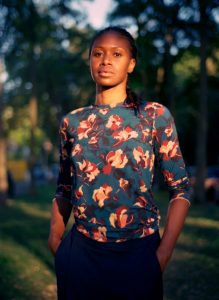
Khadidiatou Rachel Bangoura is a native of Liberia and Guinea. She was born in France and moved to Germany at the age of seven. After a BA in International Relations & Development Studies and an MA in African Studies in London, she graduated in Contemporary Dance (Danceworks Berlin) in October 2017. She works as a freelance choreographer and dancer with Jan Pusch, Okwui Okpokwasili, Ester Ambrosino (Tanztheater Erfurt), Rafaële Giovanola (Cocoon Dance), Lin Verleger (Comedia Theater) and Ives Thuwis-De Leeuw (Junges Ensemble Stuttgart), among others.
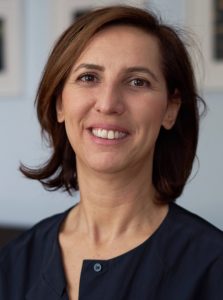
Dr. des. Özlem Canyürek Dr. des. Özlem Canyürek studied sociology, cultural management and cultural policy in Istanbul. In 2021, she received her PhD in Cultural Studies and Aesthetic Practice from the Institute for Cultural Policy at the University of Hildesheim with a thesis on “Cultural Diversity in Motion. Rethinking Cultural Policy and Performing Arts in an Intercultural Society.” She currently works as a freelance cultural policy researcher and lecturer. She is the contact person for the intersectional diversity framework of the PostHeimat network, funded by the German Federal Cultural Foundation. She is a member of GLOSACI.
Published: 17.03.2021
The first certificate course in Germany “Artistic Interventions in Cultural Education” of the Institute for Cultural Policy at the University of Hildesheim is experiencing very high demand with 456 applications for 30 places. The applicants will be informed promptly about the selection.
Criteria for the selection include experience in cultural mediation and cultural education and a close link between the applicant’s own artistic approach and the development of cultural education projects. In addition, the participants of the pilot course should complement each other as diversely as possible in terms of the artistic genres represented, age, gender, educational and work biographies, regions of origin, migration experience, working methods and target groups.
We would like to thank all applicants and invite you to subscribe to our newsletter with an email to zertifikatskurs [at] uni-hildesheim [dot] de for information on follow-up courses.The first certificate course in Germany “Artistic Interventions in Cultural Education” of the Institute for Cultural Policy at the University of Hildesheim is experiencing very high demand with 456 applications for 30 places. The applicants will be informed promptly about the selection.
Criteria for the selection include experience in cultural mediation and cultural education and a close link between the applicant’s own artistic approach and the development of cultural education projects. In addition, the participants of the pilot course should complement each other as diversely as possible in terms of the artistic genres represented, age, gender, educational and work biographies, regions of origin, migration experience, working methods and target groups.
We would like to thank all applicants and invite you to subscribe to our newsletter with an email to zertifikatskurs [at] uni-hildesheim [dot] de for information on follow-up courses.
Published: 16.03.2021
Artistic Interventions in Cultural Education – qualified training and certification for arts practitioners from the artistic disciplines of architecture, visual arts, design, film, photography, literature, media, music, performance, sound, theater, contemporary dance, circus, and other fields.
A Germany-wide certification course developed by the Institute for Cultural Policy of the Department of Cultural Studies and Aesthetic Communication at the University of Hildesheim in close cooperation with practice partners, offers a total of thirty arts practitioners from various artistic fields the opportunity to become qualified professionals in practice-based, cultural education work at schools and other organizations. With certification, participants will also be able to work in education in museums, theaters, dance and opera stages, orchestras, youth centers or at festivals. In addition, participants will receive training to become trainers themselves of future Artistic Interventions in Cultural Education certification courses.
Published: 25.11.2020